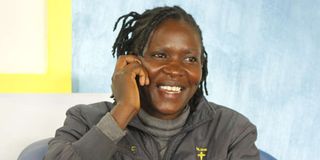I was stigmatised, they said I had HIV

Mary Wathanu, a cancer survivor, is a social worker at Meru Hospice. In the 2000, while undergoing treatment, cancer was an uncommon disease and many believed she had HIV.
What you need to know:
- Mary Wathanu came out of the grip of cancer15 years ago, and vowed to help others overcome the pain.
- She was diagnosed with leukaemia, by chance, in the year 2000 while in Class Eight.
- In 2000, cancer was not a common disease and many believed she was suffering from HIV/Aids and she was stigmatised by neighbours and schoolmates. .
- She started volunteering as a social worker at Meru Hospice while in college in 2013.
- It costs Sh8,000 to take care of one critically ill patient every month due to the high cost of pain management drugs.
For the last five years, the cancer burden in Meru County has been on the rise. One woman, a social worker at Meru Hospice has become one of the key players in fundraising to alleviate the pain of terminally ill patients.
Mary Wathanu, a cancer survivor, escaped the jaws of death 20 years ago. She shuttles from one office and retail shop to another in Meru town to raise the funds.
After coming out of the grip of the disease 15 years ago, Ms Wathanu vowed to help others overcome the pain.
She was diagnosed with leukaemia, by chance, in the year 2000 while in Class Eight. This ate into her academic progress and family fortunes.
Excruciating pain
She was playing with her younger sister who mischievously jumped and landed on her abdomen leading to excruciating pain. A few minutes later, she started swelling.
A visit to the hospital later revealed two conditions; fibroids and blood cancer! Luckily, the cancer was discovered at an early stage, making it curable.
A surgical procedure done to remove the fibroids led to her admission into intensive care unit (ICU) for one month, weighed down by chemotherapy treatment.
The 32-year-old recounts that on the day doctors recommended her discharge from ICU, she miraculously came out of a coma.
“I came out of the coma on the eve of the day my parents were to approve the withdrawal of treatment. They were shocked to find an empty ICU bed that morning, believing that I had passed on,” she recounts.
HIV/Aids
After regaining strength from the miraculous recovery, she went to recuperate from home where neighbours and schoolmates stigmatized her.
“In 2000, cancer was not a common disease and many believed I was suffering from HIV/Aids. I could not go back to school because I was still undergoing chemotherapy. I, however, wrote my Kenya Certificate of Primary Education (KCPE) after studying from home,” she explains.
Weakened by cancer treatment, Ms Wathanu was on and off Form One and Form Two classes. In 2002, she opted to drop out due to her condition and financial constraints.
She says her family was impoverished as their father’s entire salary was attached to the National Hospital Insurance Fund (NHIF) to cater for her treatment.
One of my brothers dropped out of school while others had to go to public schools. My mother resorted to odd jobs to put food on the table. I was given one choice, to continue with school or undergo treatment. I chose the latter,” Ms Wathanu says.
The social worker delightfully recounts that she was declared cancer free in 2005 after almost giving up on life.
Two years later, Ms Wathanu would go back to Form Three, and completed her secondary education in 2008.
Diploma in palliative care
“I joined Mwithumwiru Day Secondary School after teachers promised to assist me catch up with other learners,” she says.
Unable to achieve her dream of becoming a nurse, Ms Wathanu studied social work and later a higher diploma in palliative care.
“I started volunteering as a social worker at Meru Hospice while in college in 2013. This is when I discovered a gap in funding at the Hospice, and started fundraising from the community. My services became critical when a donor who was supporting all hospices in the country pulled out in 2016,” she says.
Until the Covid-19 pandemic struck, the Meru Hospice has been raising funds from schools, colleges and retail shops.
Following the closure of schools due to Covid-19, the hospice is now struggling to pay workers and support the terminally ill patients.
“Schools alone were contributing more than Sh500,000 per term. We cannot get this money now. My job and the needs of hundreds of cancer patients are on the line,” the social worker says.
Hard economic times
Meru Hospice coordinator Gladys Mucee, says the facility supports close to 500 patients with food and free drugs every year.
“We need about Sh8,000 to take care of one critically ill patient every month due to the high cost of pain management drugs. Many of the well-wishers are experiencing hard economic times leading to decline in donations. Contributions from supermarkets and wholesale shops have also gone down,” Ms Mucee says.
Ms Wathanu now looks up to donations from institutions and individuals to support the work of the hospice during the pandemic.





